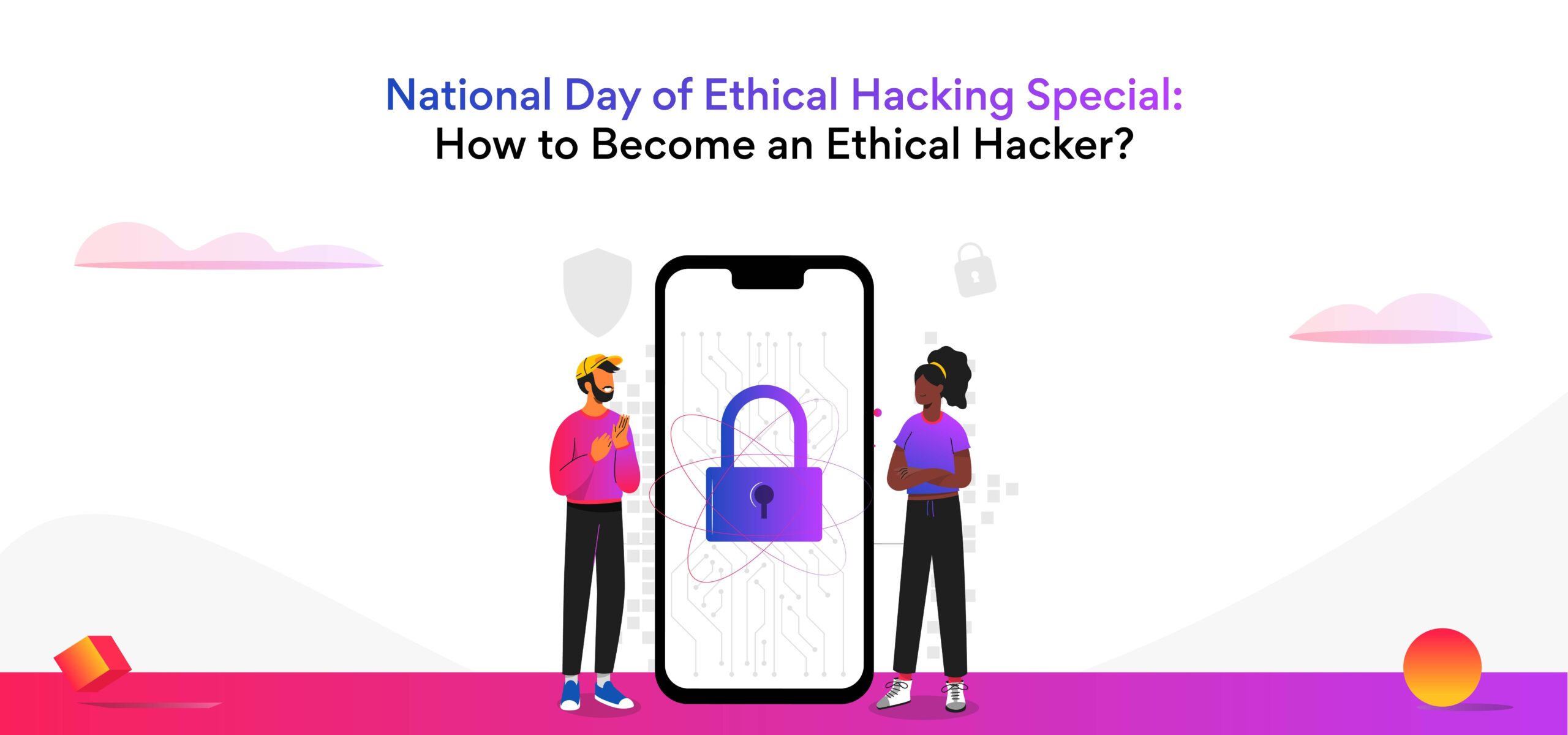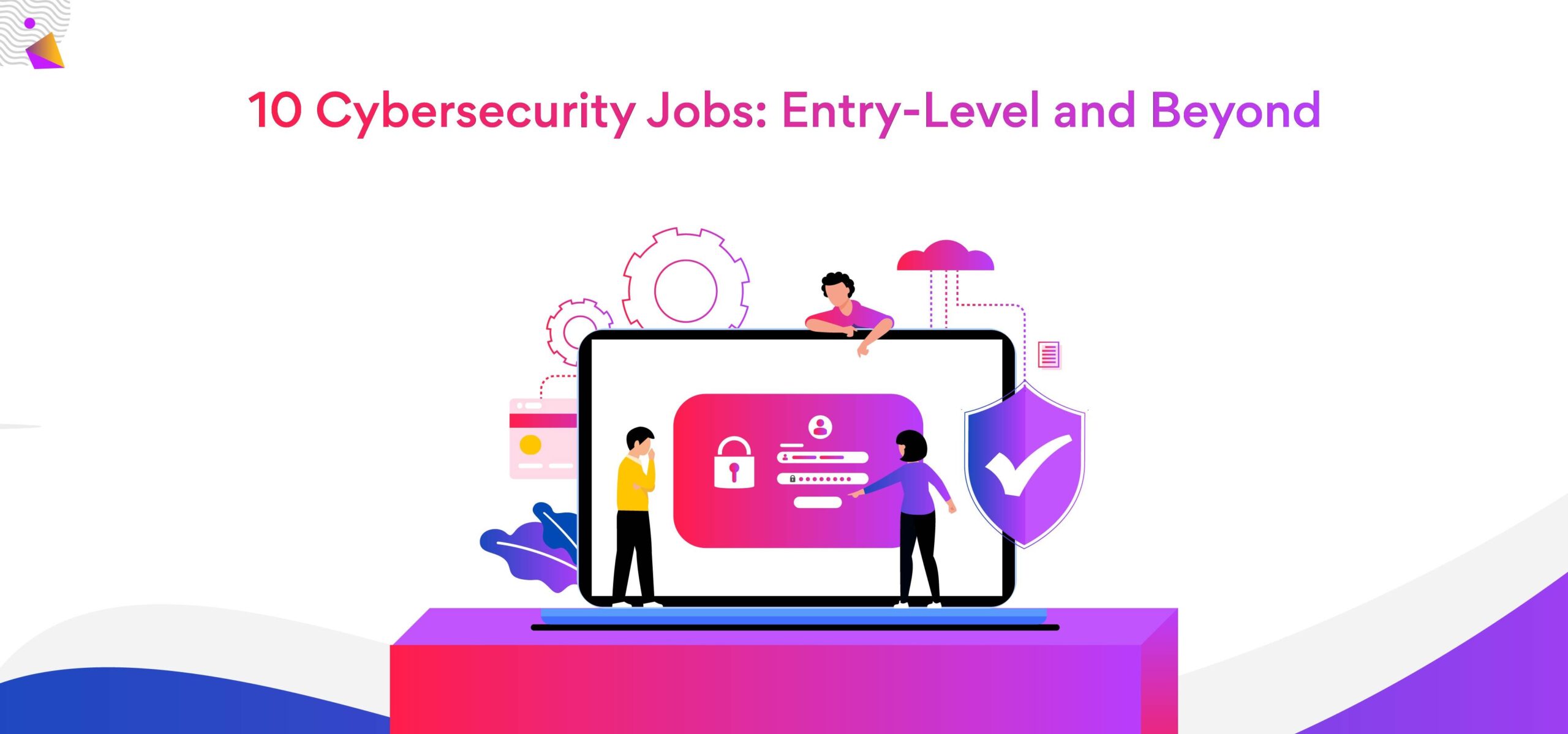National Day of Ethical Hacking Special: How to Become an Ethical Hacker?
On this national day of ethical hacking, we are discussing the eight steps to becoming an ethical hacker.
Let’s get started.
What is hacking?
Hacking is the attempt to gain access to a computer’s internal private network or system. In other words, hacking is the unauthorized use of computer network security systems for illegal purposes.
What is ethical hacking?
Ethical hacking is the ability to spot gaps in a computer network or cloud infrastructure of a company and fix the problems to stop cyber mishaps or attacks.
What is a hacker?
Hacker is an information technology expert who employs non-standard methods to accomplish a goal or get around a challenge within a computerized system.
There are several types of hackers, such as the following:
- White hat: An ethical hacker is an individual who uses their knowledge to identify network and system vulnerabilities. Such hackers have no malicious intent.
- Black hat: A hacker who gains unauthorized access to third-party systems and networks for malicious intent.
- Gray hat: A gray hat hacker is someone who gains unauthorized access to a network, software, or hardware but reveals the gaps to the company
- Green hat: Green hat hackers or script kiddies generally have no technical skills. They use pre-built hacking tools to hack computer systems, networks, sites and applications.
- Hacktivist: A person who hacks to prove a certain ideology
What is an ethical hacker?
Ethical hackers attempt to break into systems and networks using a variety of programming languages and tools. After successfully breaking into the system, they offer suggestions to the company on how to remedy the gaps and vulnerabilities in the company’s computer systems and cloud infrastructure.
In contrast to classical black hat hackers, ethical hackers help businesses strengthen the security of their systems. Also, instead of taking advantage of computer systems and networks, they use their abilities to make the company’s IT infrastructure more secure.
What is the role of an ethical hacker?
Ethical hackers may work as independent contractors, in-house cybersecurity administrators, or cybersecurity consultants for a company’s website or apps.
While working on any of these roles, ethical hackers shoulder the following responsibilities:
- Hacking their systems: To discover potential dangers, ethical hackers hack their company’s systems. Such hackers are employed to identify security loopholes in the system before outside hackers do.
- Document their findings: Ethical hackers meticulously record all of their discoveries and potential dangers. Accurate reporting of bugs and vulnerabilities posing security concerns are their primary responsibilities.
- Keep the company data safe: Ethical hackers must abide by the data security best practices to keep all of their discoveries private. They should never consent to reveal their discoveries and observations in any circumstance.
- Handle the loopholes in the company’s computer systems: Ethical hackers also fix the system’s security flaws based on their observations.
What is the career path of an ethical hacker?
Starting off in a profession as an ethical hacker entails providing defensive security services to an organization’s cybersecurity team.
Your proficiency and performance as a hacker can help you climb up the ranks. For example, you can start as a security specialist, move up to a security administrator, and later become a security software developer.
Common job roles in the field of ethical hacking:
- Information security analyst
- Cyber security analyst
- Cyber security engineer
- Security analyst
- Security Engineer
- Penetration tester
- Information security manager
What is the average salary for an ethical hacker?
Ethical hacking is a very rewarding profession. If you meet all the requirements, you could earn a salary of at least six figures.
The average ethical hacker salary, according to Glassdoor, is $114,648. Also, the top ethical hackers might earn over $700,000 in total remuneration due to their crucial role in a company’s cybersecurity.
However, the remuneration largely depends upon factors like experience, skills, education, projects, geography, and salary negotiation skills.
How do you become an ethical hacker?
You will need technical proficiency and interpersonal abilities to become an ethical hacker. In addition, ethical hackers should also be innovative problem solvers. Solid communication skills are also very important.
In addition, some ethical hackers have “social engineering” skills as well – Instead of hacking a system digitally, they attempt to persuade people to provide them with the information they require.
Although some have degrees in electrical engineering or information security, the majority of ethical hackers have a college degree in computer science. Ethical hackers often have several years of experience working in IT as security specialists or programmers.
Some people may gain their hacking skills via independent research and trial-and-error. However, the majority of companies favor hiring applicants with formal education and certificates in ethical hacking.
Ethical hacker certifications
Certified Ethical Hacker (CEH) and Offensive Security Certified Professional (OSCP) are the two certificates that are specifically related to ethical hacking.
The CEH certificate represents the unique network security discipline of ethical hacking.
Similarly, the OSCP test comprises questions on a virtual network with targets that have different operating systems and configurations. The candidate who passes the test will have proven their ability to investigate the computer network, spot any weaknesses in the system, and carry out cyber attacks.
Although there are other certifications available, these two certificates are the most popular ones.
Related post: AWS Certification Guide – All You Need to Know
8 steps to become an ethical hacker
Step 1: Gain solid proficiency in LINUX/UNIX
Since Linux is one of the most often used operating systems for hacking, you should be familiar with it if you want to be an ethical hacker.
The most well-known Linux operating system created specifically for hacking is Kali Linux. Other examples include Red Hat Linux, Ubuntu, Kali Linux, BackTrack, and other popular Linux distributions.
Step 2: Acquire a solid understanding of popular programming languages
C is considered to be one of the earliest computer languages and is also known as the mother of all programming languages. Also, C serves as the foundation for learning UNIX/LINUX. Therefore, to fully leverage the open-source operating system Linux, you must learn C programming.
In addition, ethical hackers are proficient in at least two to three programming languages, such as the following:
- Python: Extensively used for exploit writing
- SQL: Best for hacking large databases
- PHP: Helps fight against malicious attacks
- JavaScript: Suitable for hacking web applications
Step 3: Learn to be anonymous
The most crucial step in ethical hacking is learning how to mask your identity.
If black hat hackers discover that there is another user in the network, they may attempt to attack that user’s system. Therefore, anonymity is essential for ethical hackers.
The three most promising methods for protecting your identity online are Anonsurf, Proxychains, and MacChanger.
Step 4: Get well-acquainted with networking concepts
For ethical hackers, understanding networking principles and how they are made is essential.
Exploiting vulnerabilities requires knowledge of numerous network protocols. Ethical hackers who have an in-depth understanding of networking technologies like Nmap, Wireshark, and others are in high demand these days.
Here is a list of a few more important networking concepts that an ethical hacker should be well aware of:
- Subnetting
- TCP/IP Network
- Network Masks and CIDR
- Automobile Networks (CAN)
- Address Resolution Protocol
- Wireless Networks
- Bluetooth Networks
- Simple Network Management Protocol
- Server Message Block
- Domain Name Service (DNS)
- SCADA Networks (Modbus)
Step 5: Increase familiarity with the deep and dark web
The dark web refers to a large portion of the internet that is hidden or invisible to common search engines. Access to the deep and dark web requires specialized authorization or software like the Torr browser.
Although the dark web is a haven for criminal activity, not all of it is unlawful. The deep and dark web has a respectable side as well, and ethical hackers need to know how they operate.
Step 6: Learn cryptography
Information security uses encryption for several purposes like authentication, data integrity, secrecy, and more. Therefore, cryptography is a valuable skill for an ethical hacker.
Step 7: Dive deeper into hacking
Once you have a firm grasp of the basic hacking tools and techniques, dive into the basics of SQL injections, penetration testing, vulnerability analysis, and more.
Keep up with the most recent system security updates, as well as the newest hacking and system security tools and techniques. For the same, follow online forums and blogs.
Some of the most popular online forums and blogs for hacking are as follows:
- IT Security Guru
- Security Weekly
- The State of Security – Tripwire
- The Hacker News
- Schneier on Security
- Infosecurity Magazine
- CSO Online
- Troy Hunt
Related post: 9 Best Forums for Developers to Join in 2022
Step 8: Explore vulnerabilities
System weaknesses or gaps are vulnerabilities. Acquire the skill of scanning networks and systems for security gaps. Some vulnerability identification tools in the Kali Linux operating system are as follows:
- Nessus Vulnerability Scanner: Identifies issues in web applications
- Nikto Vulnerability Scanner: Identifies issues on web servers
- OpenVAS Vulnerability Scanner: Identifies issues in devices within a network
- Wapiti Vulnerability Scanner: Identifies web application issues like SQLi and XSS
- Nmap Vulnerability Scanner: Identifies issues across multiple systems
In addition, you should also know about vulnerability testing tools like Metasploit, OpenVAS, and Nessus.
How to gain experience as an ethical hacker?
- Practice resolving susceptible machines from Hack The Box and Vulnhub.
- Try bug bounty platforms to simulate real-world conditions.
- Hack actual running websites. However, make sure to do no harm.
Conclusion
Ethical hacking is not an easy career path, but it can be a lucrative option for those who find math, problem-solving, critical thinking, and coding interesting.
If you are an experienced software engineer looking for a great career, try Turing.com. Turing offers the world’s best remote software developer jobs that offer amazing compensation and benefits. Visit the Turing jobs page for more information.
FAQs
- Can I become an ethical hacker?
Yes, anyone with the necessary skills and training can become an ethical hacker. - What qualifications do I need to be an ethical hacker?
College degrees in computer science, two-year degree programs in IT, or ethical hacking certificates are some of the prerequisites for building a career as an ethical hacker. - How long does it take to become an ethical hacker?
The amount of time it takes to become an ethical hacker relies on your experience, skills, and credentials. It can take a few weeks or several years to become a proficient ethical hacker.
Frequently Asked Questions
What is the difference between NLP and QNLP?
QNLP (quantum-inspired neural models) for NLP differs significantly from existing NLP in that it employs the mathematical foundation of quantum theory to represent language aspects. The neural network then receives these quantum-theoretical properties as input. Further, since quantum mechanics notions have more detailed physical justifications, they are easier to understand when used to explain features.
What is DisCoCat?
The categorical distributional compositional (DisCoCat) model for natural language serves as the theoretical foundation for all QNLP techniques. DisCoCat encodes lexical meanings as quantum states and processes that may be implemented as quantum circuits in specialized hardware or simulators.
What are the key applications of QNLP?
The key applications of QNLP include language production, text-to-voice processing, text analytics, automated speech, bioinformatics, etc.
Join a network of the world's best developers and get long-term remote software jobs with better compensation and career growth.












